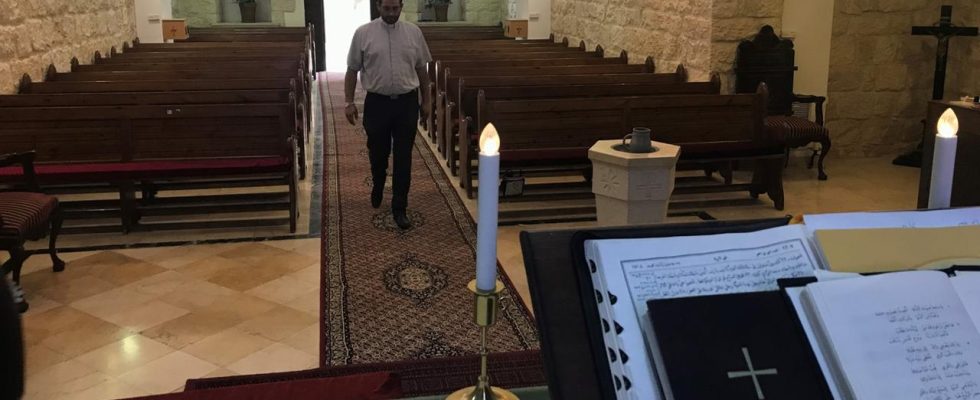report
After the Hamas attack, peace between Israelis and Palestinians seems further away than ever. The situation in the Israeli-occupied West Bank is also tense, reports the pastor of a Protestant congregation.
Early afternoon in the streets of Beit Jala: The town of 12,000 inhabitants borders on Bethlehem. Located in the Palestinian West Bank, a few kilometers south of Jerusalem.
Anyone who wants to get here has to pass through Israeli army checkpoints. Most of them: Closed since October 7th. This sometimes makes people’s lives complicated. Also that of Ashraf Tannous. The Protestant pastor comes here every day from Jerusalem.
Pastor Ashraf Tannous’s Protestant church in Beit Jala in the West Bank.
War is not a topic for sermons
On this day too, he unlocks the wooden church door. A carpet muffles his steps. Ashraf Tannous has already prepared the sermon for mass on Sunday. It shouldn’t be about politics. Never – despite the situation, despite the place where he will keep her:
I only proclaim spiritual news because in this situation today there are so many unanswered questions and when we as pastors talk about politics, we are moving away from God. And also I need to inspire hope: teach how to hope and love in a very difficult situation.
But our conversation should be about politics. About how Ashraf Tannous feels as a Christian Palestinian. How his community is doing – with its around 600 members.
“We live in a very difficult situation. We don’t know what the next minute will bring us or what tomorrow will bring,” says the priest.
Disappointed of more international diplomacy
Ashraf Tannous was far from his homeland for a year. He worked as a vicar in the Gütersloh district in North Rhine-Westphalia. He is disappointed with international diplomacy. Also from Germany. He says he has no expectations of Foreign Minister Baerbock’s visit to the region.
According to him, the Palestinian civilian population plays a subordinate role in the debate about the situation in the Middle East. “I feel that we are not seen as normal people. If Palestinians are killed, it doesn’t matter. But that’s not it!” The Protestant pastor is not alone with this feeling.
Hardly any tourists anymore because of the war
A visit to Jack Giacaman’s workshop in nearby Bethlehem: A worker carves a figure out of olive wood using an electrically operated tool. On long shelves in front of him: the three kings, sheep and donkeys – nativity figures. A bestseller in normal times, but because of the war the tourists stay away.
“I opened the workshop so that my workers can earn something here at least on a few days. I have a good team. I’m doing my best – also because I don’t want to lose the good wood carvers. If that were to happen, I might have to close down ” said Giacaman.
Does he have hopes for international diplomacy? Giacaman waves him off. Neither the EU nor the USA have been able to prevail against Israel so far. He feels threatened by heavily armed Israeli settlers in the West Bank. There is no protection. And he complains that too little humanitarian aid is still reaching the Gaza Strip:
They don’t have enough power to stop the war if they can’t even help the children. Don’t help Hamas under any circumstances! But help the children with food, water and medicine!
Hope for just peace
Giacaman seems bitter. Pastor Ashraf Tannous, on the other hand, is looking for conciliatory words. He just wants a normal life, a humane one for the Palestinians in the Holy Land: “We are people who are looking for a better future. We don’t want violence. We talk about peace, justice and equality. The whole world must also recognize that “There are people here who have no rights and that’s why violence happens.”
The solution for him: A just peace; a state in which everyone can live. As a religious person, this is conceivable for him, says Tannous. Will it ever be politically possible? He can’t answer this question, says the priest, looking out over the Israeli-occupied West Bank from the roof of his church.

